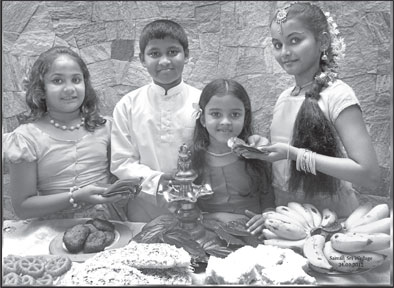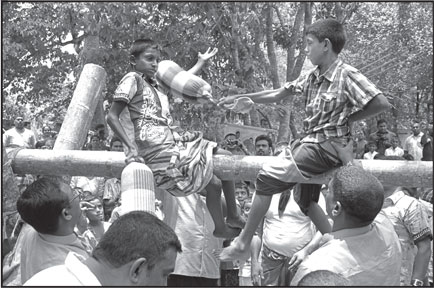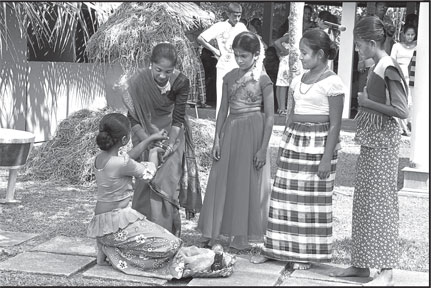New Year reminiscences
Professor Sunanda MAHENDRA
With the dawn of April every year, I go down the memory lane. It was
the post war period in our country - mid 1940s. My father was busy as a
divisional health inspector travelling by a health propaganda van
helping people understand health care issues. He was instrumental in
creating health songs and health plays shown in village premises. He
used to tell us all about these matters.
 But one thing was certain. He would come home to enjoy the bliss of
the New Year. Our mother looked after us and accompanied us to her
ancestral house in Seeduwa. Her father, my grandfather, was a physician
and a headman. It was to the physician's house that villagers used to
come in order to discuss matters relating to the New Year. But one thing was certain. He would come home to enjoy the bliss of
the New Year. Our mother looked after us and accompanied us to her
ancestral house in Seeduwa. Her father, my grandfather, was a physician
and a headman. It was to the physician's house that villagers used to
come in order to discuss matters relating to the New Year.
Ceremonial start
As I recall, grandfather was no more at the time when I experienced
the first New Year ceremony held at our ancestral house. Just a few days
before the New Year dawn a man used to visit with a small sheet of paper
in his hand. This he would hand over to my grandmother. I came to know
it as the ‘avurudu seettuva’ or the list of activities that has to be
done during the period, in keeping with auspicious times.
The sheet had been issued by the priest in the village. The
auspicious times and the events scheduled to take place are listed in
this sheet of paper. On accepting the upasaka of the temple, the
grandmother would invite him to partake of some tea and other eatables
prepared to celebrate the New Year. Perhaps he is the first comer to the
ancestral house prior to the dawn of the New Year. Apart from this
‘avurudu seettuva’ there is the wall almanac or the ‘bit lita’ which
helps us know the exact times. The very first auspicious event is the
‘nonagate’ or the time in which there is no exact auspicious moment. It
is believed to be astronomically the period of transmission of planets
(Sankranti Kalaya) into a new month. This moment is called ‘dolos
mahakata yana davasa’ [one day in twelve months). This is calculated in
keeping the month of April, known as the first month.
The term ‘bak’ as I understood from the adults comes from the
Sanskrit term ‘bhagya’ or prosperity. The dawn of this day is the
beginning of a new year and the end of another year. This is also
indicated as the punyakalaya, where adherents are allowed to relax and
contemplate on religious matters. They are not allowed to work either in
the field of in the house. The business dealings come to a temporary
close. By this time the preparations for the dawn of the year is almost
over people.
When other people in the village go to the temple, all of us in the
ancestral house enter the shrine room of the grandfather believed to
have relics brought from the temple. A special puja will be performed
prior to the New Year and clad ourselves in clean cloths gifted by the
mother and the grandmother and other elders. Everything handled in the
house is regarded as a new item. Even the sheaf of betel or the bulat
ata is new. Bulat plays a vital role in the New Year activities.
Born in the land
Once again, as I came to know from an adult the term bulat means
‘bhumiye lat’ or ‘planted in the earth'. The legend is an extension of
the Sasa jataka where Sakka, the god of gods, paints the image of the
pious hare and drops down the brush. This brush which falls on the lap
of the king naga of the naga world is planted. The plant which is a
medicinal herb had been passed on to humans. The humans in turn make use
of bulat as a multi purpose herbal plant.
 |
|
Picture by
Samantha Weerasiri |
The house too is given seen a new facelift. The food is cooked in new
pots and pans brought from the village clay potters (kumbal karuvan) by
pingo men (katkaraya). A whole lot of pots are brought into the kitchen
by the grandmother. They are handed over to the servants in the utmost
care.
When the New Year food is cooked the spiritual attention is paid as
one observes the veneration of inanimate objects as an integral item on
the part of the housekeepers. The best time out of all auspicious times
is the time devoted to partake of the new year food laid on a long
table, and served taking into account the order of the seniority of
elderliness. The food should, as a ritual, include the ‘hatmaluva’ all
inclusive of vegetables.
There are seven in number all mixed into one dish as it was believed
that the New Year too coincides with the ritual of the Pattini Devi. A
virtuous Pattini cursed into seven directions saying that may there be
drought and fire in seven directions for punishing her husband Palanga.
The long story if to be shortened goes as a the ruling of a certain
cruel king who had been in existence long time ago. In order to get the
good looking Pattini, into his possession, the king desired to kill the
husband.
But as she was too virtuous, she cursed the king who killed her
husband, This feminine quality was praised by Sakka and came down to the
earth to make enquiries as to what had happened. The good god Sakka
found that the lecherous and cruel king had to be taught a lesson by
creating a drought in seven directions as cursed by Pattini. An
unbearable climate ensued, resulting in the mass deaths of humans as
well as animals. The king was troubled and the humans made
representations to the king regarding their sufferings.
Virtuous cursing
Then came the wise men of the region who advised the king to
contemplate on the bad behaviour of himself, in order to bring back a
natural harmony. This realization as a king brought back to life, the
husband Kovalan or Palanga who is well portrayed in the Sinhala ballad
‘Pattini Hella’ and the Tamil ballad ‘Silappadikaram'.
This is one of the reasons why the Tamils Hindus and Buddhists
celebrate this season of well being in keeping with their cultural
ethos. When the climate changed the trees as well as the vegetation was
lively. The food brought from the seven directions included cadju,
vattakka dalu, kosata or jak seeds, ash plantains, vambotu, etc. This
food is believed to be one of the most delicious meals brought down the
generations.
The hatmaluva is cooked once a year only to celebrate the new year
meal. The housewife will see to the fact that the meal is devoid of fish
and meat.
 |
|
Picture by
Tilak Perer |
The hatmaluva is mixed with the newly cooked milk rice or kiribat.
The milk rice is made out of the newly brought harvest (alut sahal)
first taken to the temple and blessed which is called pansal panguva or
the share for the temple. The most significant feature in the New Year
is the period of ganudenu or the transaction of money.
The junior members in the family will give a little money to the
elders, but in turn the juniors will undoubtedly receive double the
amount from the seniors. There is also the transaction of money on the
part of the housewife with the water well in the compound. It is
believed that though the watering well is an inanimate helper, yet it is
regarded as a fused family member who needs to be looked after as a near
and dear relative.
Day in day after the housewife and her cooks have to look after the
water well carefully to see that the water is clean and fit for drinking
and cooking. The animals in the house too are looked after well during
this period. In our ancestral house there lived two bulls and two cows.
All of them helped our lives as relatives of the house. They were given
fresh anointment of oil on their skins before the dawn of the New Year.
They were also fed with the newly brought punnaku and hay in new
buckets. The grandmother goes to have a look at them, and she used to,
as I remember talk to them, blessing them to look after us for the years
to come.
The auspicious time to do work is called ‘wada allima’ or the
commencement of work. During this period, the members of the family are
requested to concentrate on the work they have to do. The aunties will
take up knitting and sewing.
The uncles or mamas will go out to the compound with the gardening
utensils to plant new trees. This is kept in keeping with one's own
occupation. One of my uncles happened to be a teacher. I saw him taking
out the Buddhist text and reading stanzas. I was sensitively influenced
by this trend of work.
Since then I too take out Dahmmapada and read during the ‘wada
allima’ time. Some servants engage themselves in their daily work like
piling firewood, treating animals, and planting trees etc.
Then comes the auspicious time for anointing oil on the head (hisatel
galvima). This is done by veterans who use the given list of herbal
leaves inclusive of kohomba and nuga. Here again betal plays a vital
role. The place, where this is performed normally, is the temple under
the guidance of seniors who are skilled in the performance. While
applying the medicinal oil a meaningful stanza is uttered. It goes as
follows:
‘Molgahe dalulanaturu
kalukaputa suduvenaturu
gembidittita tana enaturu
ekasiyavissata desiya vissak ayuboveva’
(Until the pounding pole sprouts out tendrils, until the black crow
turns white, and until the she tadpole gets breasts, may you live two
hundred and twenty years, instead of one hundred and twenty years).
As children the verse as uttered by the elders while applying oil on
our heads looked like lyrics that evoke a smile in the first hearing.
But today, as we rediscover things of the past, we see that there is
sense in each line of utterance.
It is said that the highest age is 120 years. But the blessing is to
make one live 220 years. With this blessing we leave the premises with a
heart full of happiness. We take a dip in the river or go to a place to
take our first bath for the New Year.
Followed by this ritual we have time to play various folk games. We
become either participants or observers or both. New Year brings
families together. New Year makes us feel the bliss of participation.
|



